Reading Time: 16 minutes
This extended blog explores polling and public opinion in relation to assisted dying across the UK from 2004 to present. It focuses on the perceived impact on disabled people, lower age limits to access assisted dying, and attitudes of healthcare professionals, as identified as areas of interest during Stage 1 consideration of the Assisted Dying for Terminally Ill Adults (Scotland) Bill. The contents below are provided to ease navigation.
This blog includes UK-wide polls that cover Scotland to some degree, but we haven’t assessed how representative the results are in relation to Scotland and make no judgement on the sampling or weighting used. This blog is not intended to be exhaustive coverage of all polls on this subject, just a selection of those that address specific issues raised in the Committee’s Stage 1 scrutiny. The focus is on polls where we were able to access information on the framing of questions, the sample sizes and the raw data.
The polls used coincide with the timing of various attempts to legislate for assisted dying across the UK. In some cases, the polls refer directly to particular pieces of legislation, which are identified in the accompanying text. The specific provisions detailed in these pieces of legislation are not directly comparable to the Assisted Dying for Terminally Ill Adults (Scotland) Bill.
Attempts to legislate for assisted dying in Scotland
There have been four attempts to legislate for assisted dying in Scotland over the life of the Scottish Parliament:
2004: Jeremy Purvis MSP’s Dying with Dignity Consultation paper. The Bill didn’t get the required number of supporting MSPs (18) to be introduced.
2013: Margo MacDonald MSP’s Assisted Suicide (Scotland) Bill. Margo MacDonald lived with Parkinson’s disease and died in 2014. At this time, Patrick Harvie MSP took over as Member in charge of the Bill. The Parliament did not agree to the general principles of the Bill on 27 May 2015, by 82 votes to 36, with no abstentions, and the Bill fell.
Attempts to legislate for assisted dying in the rest of the UK and Crown Dependencies
Attempts to bring in a law to allow assisted dying in the UK have been introduced several times, starting with Lord Ponsonby’s Voluntary Euthanasia (Legalisation) Bill, debated in 1936. Since 2003, Lord Joffe, Lord Falconer and other MPs have attempted to introduce legislation many times but all have been rejected, defeated or ran out of time within the relevant parliamentary session.
Kim Leadbeater MP introduced the Terminally Ill Adults (End of Life) Bill in the UK House of Commons in 2024 as a Private Member’s Bill. The Bill passed its third reading in the House of Commons in June 2025, moving on to the House of Lords for further scrutiny.
Dr Allinson introduced the Assisted Dying Bill 2023 to Tynwald, the Parliament of the Isle of Man in June 2023 and the Bill was approved by the Isle of Man’s Legislative Council on 25 March 2025.
At its sitting on 21 May 2024 the States Assembly approved detailed proposals for assisted dying in Jersey, and requested the Minister for Health and Care Jersey to bring forward primary legislation that permits assisted dying in Jersey for those with a terminal illness. The Draft Assisted Dying (Jersey) Law was lodged on 2 September 2025.
Polling and public opinion
Some caveats
Multiple opinion polls and surveys on public attitudes to assisted dying, assisted suicide and voluntary euthanasia have been published over the last 20 years. We have chosen to use the term “assisted dying” in this briefing when talking about all types of assisted death.
Polls and surveys are often seen as useful in assessing public opinion on a topic. However, there can be issues using the results of polling to draw broad conclusions.
In the case of polling and surveys around public attitudes to legislate for assisted dying, results can be influenced by the detail of the questions asked, how the questions are worded and how many questions are asked on the same topic. Surveys can lack substantive data on legislative proposals or alternatives and are largely quantitative in nature so may miss nuance in opinions. Sample size can also affect the results and samples might not be reflective of the wider population. Therefore, polling might not give an in-depth accurate picture on such a complex issue.
Opinion in the general population
The House of Lords First Report on the Assisted Dying for the Terminally Ill Bill, published in March 2005 details results of a commissioned review of opinion surveys over the preceding 10-20 year period. That review found that, at face value, there was “a great deal of sympathy within society, at least for the concept of euthanasia”. The review, covering UK polls, found “widespread and growing concern to legalise the situation of the terminally ill who wish to die and those prepared to help them”.
Public opinion polls and surveys since then have generally shown that a majority of adults in Scotland and the rest of the UK support a change in the law to allow assisted dying for someone who is terminally ill.
The National Centre for Social Research (NatCen)’s annual British Social Attitudes (BSA) survey has tracked social and political attitudes since 1983, including voluntary euthanasia. NatCen use the phrase ‘voluntary euthanasia’ to refer to someone else administering a substance that enables another person to die.
The BSA asked whether doctors should ever be allowed by law to end the life of a person with an incurable and painful illness, from which they are likely to die in the next few weeks or months.
The Assisted Dying for Terminally Ill Adults (Scotland) Bill uses a “terminal illness model”, which allows people diagnosed with a terminal illness to choose to end their lives with medical assistance, as is the case in Australia, New Zealand and the United States of America. While the Bill in Scotland focuses on self-administration, results of this survey give insights into wider public opinion around assisted dying for someone diagnosed with a terminal illness.
British Social Attitudes – public attitudes to assisted dying
Q1. First, a person with an incurable and painful illness, from which they are likely to die in the next few weeks or months – for example someone dying of cancer. Do you think that, if they ask for it, a doctor should ever be allowed by law to end their life, or not?
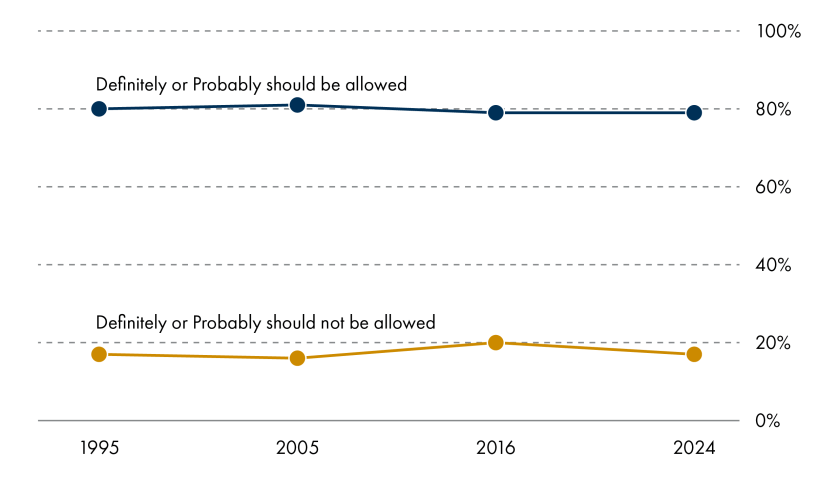
Data source: British Social Attitudes Survey, National Centre for Social Research – 2024, 2016, 2005, 1995. Public support for legal change towards assisted dying | National Centre for Social Research
NatCen reports that “over time, while there has been a small decrease in the number who think doctors should definitely be allowed to end the life of a person with incurable and painful illness, overall public support for this measure has remained high and stable”. NatCen further reports that around 8 in 10 people have stated doctors should definitely or probably be allowed to end the life of a person who is terminally ill at every point this question has been asked.
The BSA further asks what the public thinks about a more far-reaching “unbearable suffering” model, where assisted dying or sometimes a form of euthanasia is permitted for people who are experiencing unbearable suffering, as is the case in Canada, Central and South America and Europe. Please note, this is not the proposed model within the Assisted Dying for Terminally Ill Adults (Scotland) Bill.
British Social Attitudes – public attitudes to assisted dying
Q2. Next, a person with an incurable and painful illness, from which they will not die. Do you think that, if they ask for it, a doctor should ever be allowed by law to end their life, or not?
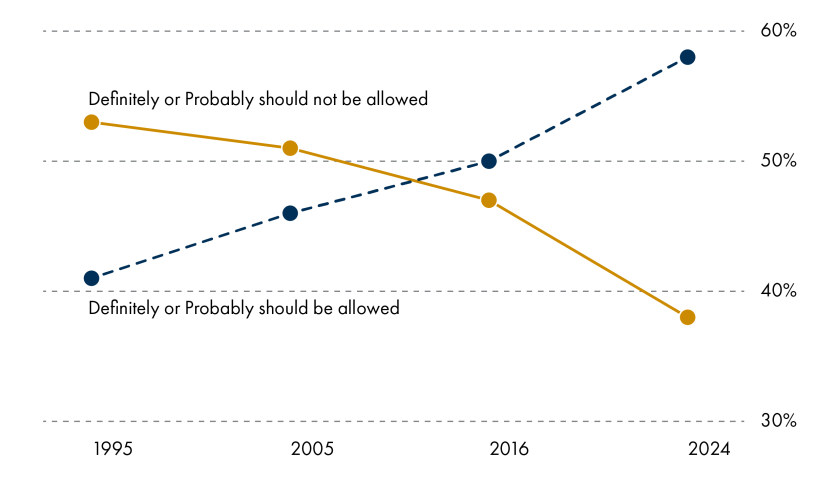
Data source: British Social Attitudes Survey, National Centre for Social Research – 2024, 2016, 2005, 1995. Public support for legal change towards assisted dying | National Centre for Social Research
NatCen reports that public attitudes on this issue have become significantly more favourable over time – in 1995, just 41% thought doctors should definitely or probably be allowed to end a person’s life in this situation, compared to 58% in 2024. Please note, this is not the proposed model within the Assisted Dying for Terminally Ill Adults (Scotland) Bill.
While NatCen has focused its polling on voluntary euthanasia, YouGov, an international online research data and analytics technology group, has been tracking public opinion on assisted suicide since August 2019.
Its polling shows sustained support for someone living with a terminal illness to access an assisted death:
YouGov: tracking public opinion on assisted suicide
Should the law be changed to allow someone to assist in the suicide of someone suffering from a terminal illness?
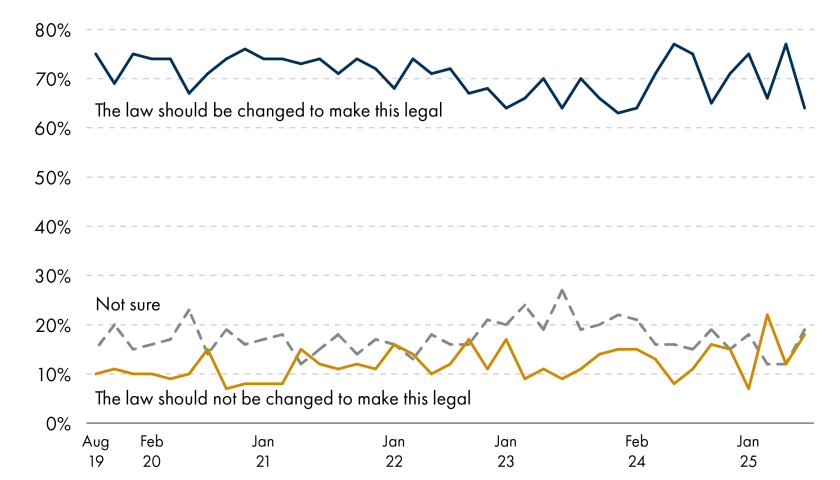
Data source: YouGov bimonthly tracker, 2025, – Should the law be changed to allow someone to assist in the suicide of someone suffering from a terminal illness?
However, the same polling shows lower levels of support for someone suffering from an incurable but not terminal illness to access an assisted death:
Should the law be changed to allow someone to assist in the suicide of someone suffering from an incurable but NOT terminal illness?
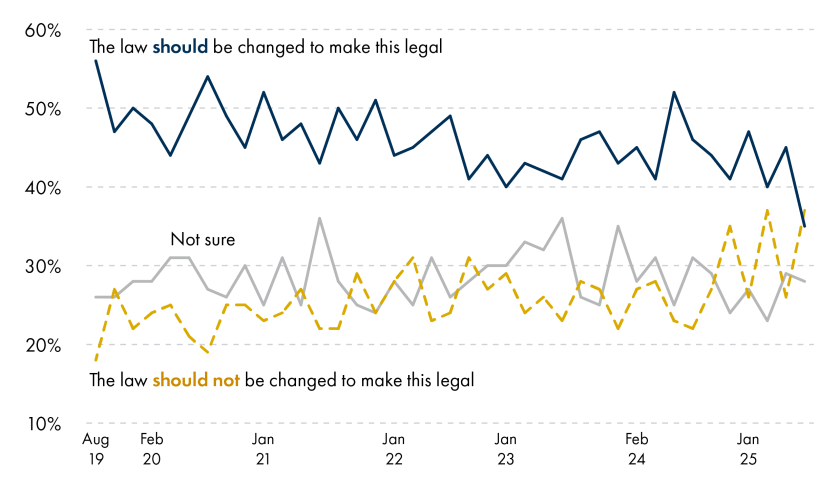
Data source: YouGov bimonthly tracker, 2025, – Should the law be changed to allow someone to assist in the suicide of someone suffering from a terminal illness?
Perceived impact on disabled people
There have been fewer polls asking the general population of their perception of the impact of legislation on disabled people, and fewer surveys again asking disabled people about their opinions. The following are examples of surveys that have been undertaken when legislation in the UK Parliament was either upcoming or introduced.
The commissioned review of opinion polls set out in the House of Lords First Report on the Assisted Dying for the Terminally Ill Bill in March 2005, found:
‘The attitudes of disabled people appeared to be more mixed. A 2003 poll for the Disability Rights Commission suggested, though on the basis of a small sample, that disabled people were concerned that they might be threatened by euthanasia legislation, while a 2004 YouGov survey carried out for the [Voluntary Euthanasia Society] suggested that disabled people supported the [Assisted Dying for the Terminally Ill] Bill as strongly as able-bodied people.’
The YouGov survey carried out on behalf of the Voluntary Euthanasia Society (now named ‘Dignity in Dying’) in 2004 asked the sample whether the current law discriminates against disabled terminally ill patients who wish to choose when to end their lives by suicide but are unable to do so without someone else’s assistance. The sampling strategy is not specified but the data table states that 24.8% of respondents had a disablement. 82 per cent of people with a disablement indicated that in their opinion, the law discriminates against disabled terminally ill patients. 75 per cent of people without a disablement indicated that in their opinion, the law discriminates against disabled terminally ill patients.
The explanation given as background to the question stated that “the current law allows people to end their lives by committing suicide, but it is an offence to assist anybody who wishes to commit suicide. This means that it is legal for a physically able terminally ill patient to choose when to end his/her life by committing suicide, but it is not legal for a disabled terminally ill patient who is not physically able to commit suicide on their own to receive assistance from somebody else in order to carry out their wishes.”
The survey asked whether the respondent supported or opposed the Assisted Dying for the Terminally Ill Bill, which was under consideration in the House of Lords at that time (2004). The survey then asked, among a series of other questions, if the Bill were to become law, would it havea positive or a negative impact on society’s views of disabled people, or no real impact at all?
If this Bill were to become law, do you think it would have a positive or a negative impact on society’s views of disabled people, or no real impact at all?
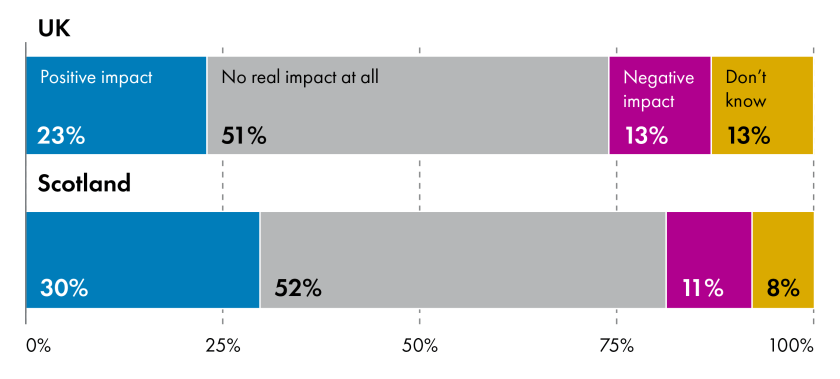
Data source: YouGov survey carried out on behalf of the Voluntary Euthanasia Society, 2004, YouGov Survey Results Results for VES
If this Bill were to become law, do you think it would have a positive or a negative impact on society’s views of disabled people, or no real impact at all? (Answers from respondents with a disablement)
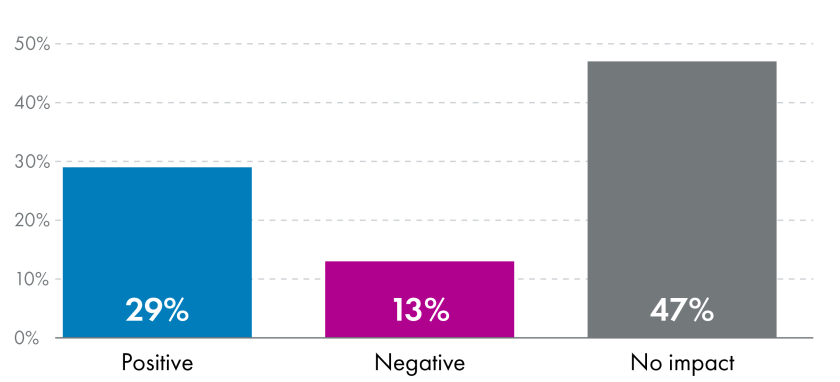
Data source: YouGov survey carried out on behalf of the Voluntary Euthanasia Society, 2004, YouGov Survey Results Results for VES
If this Bill were to become law, do you think it would have a positive or a negative impact on society’s views of disabled people, or no real impact at all? (Answers from respondents without a disablement)
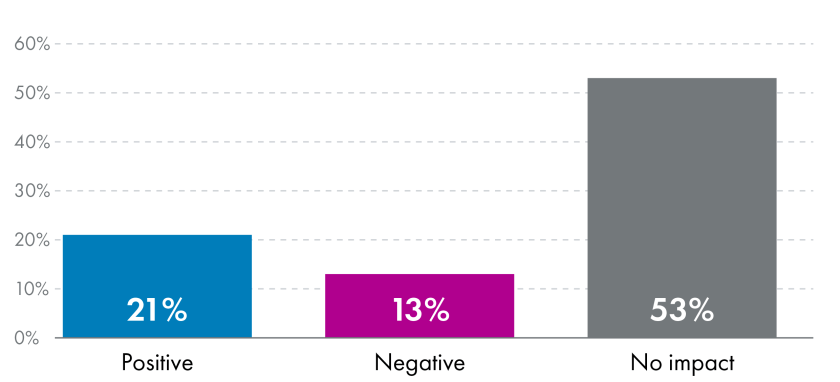
Data source: YouGov survey carried out on behalf of the Voluntary Euthanasia Society, 2004, YouGov Survey Results Results for VES
In October 2014, a YouGov survey carried out for Dignity in Dying asked a series of questions aligned with the introduction of the Assisted Dying Bill in the House of Lords in 2015. The sample consisted of British adults.
Respondents were told that “on the next few pages, there are some arguments people have made in opposition to assisted dying”. They were then asked how convincing or unconvincing they found each of the arguments. The following two arguments posed were in relation to disability groups and disabled people respectively:
All major disability rights advocacy groups in Britain oppose a change in the law to permit assisted suicide including Disability Rights UK, SCOPE, UK Disabled Person’s Council and Not Dead Yet UK.
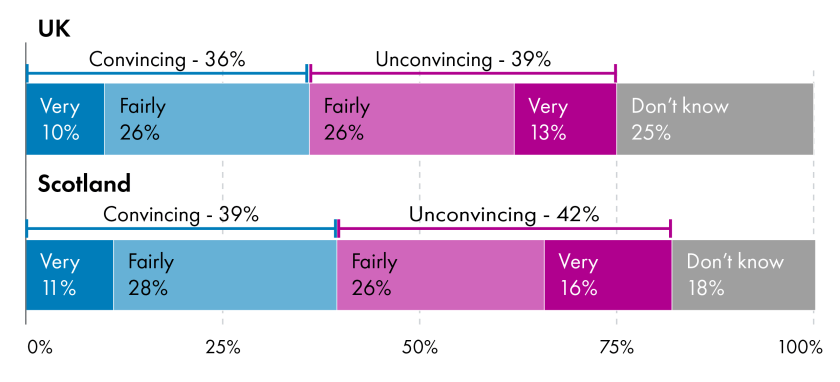
Data source: YouGov survey carried out for Dignity in Dying, 2014, YouGov / Dignity in Dying Survey Results
A poll of 1,000 disabled people found that 79% would support a change in the law to allow assisted dying for terminally ill adults.
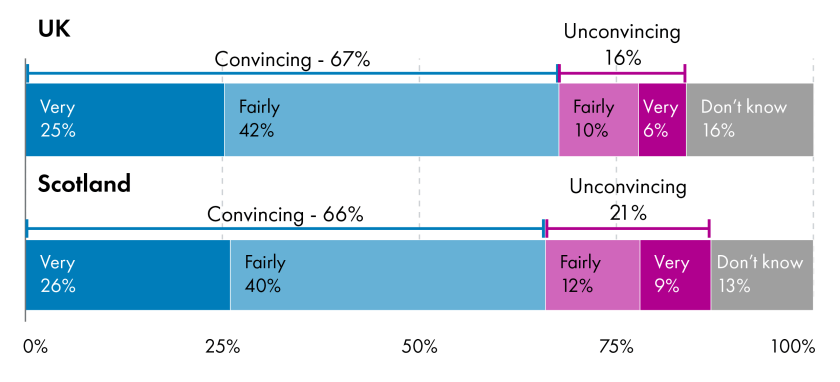
Data source: YouGov survey carried out for Dignity in Dying, 2014, YouGov / Dignity in Dying Survey Results
The questions in these polls show how convincing the sample found the argument posed, but didn’t directly ask about the respondent’s own support for or opposition to the legislation. The arguments posed in the polls suggest that disability rights advocacy groups appear overall to oppose a change in the law, while the surveyed disabled people appear to support a change in the law.
The poll referred to above, indicating that 79% would support a change in the law to allow assisted dying for terminally ill adults, was referenced by Dignity in Dying on their website in December 2013. However, the poll itself does not appear to be available online. Dignity in Dying report that this article in the Times, suggests that “those groups who remain opposed to assisted dying are out of touch with the views of those they represent.” Dignity in Dying also report that the poll referred to in 2013 found that:
46% believed disability rights groups should remain neutral on the issue of assisted dying
36% believed disability rights groups should support assisted dying
8% believed disability rights groups should oppose assisted dying
During an oral evidence session of the Health, Social Care and Sport Committee considering the Bill at Stage 1, the Member in charge of the Bill questioned disability rights organisations on their stance in regard to assisted dying. The Member noted that Disability Equality Scotland undertook a survey of its membership in 2022, which showed strong support for assisted dying among 57 per cent of its members and support among 20 per cent, with opposition at just over 10 per cent. Tressa Burke from the Glasgow Disability Alliance argued that “For disabled people, however, I struggle to believe that the groundswell of support that you describe would exist among Glasgow Disability Alliance members. I know for a fact that the people with whom we have engaged have almost universally been against it.”
In April 2025, a YouGov survey carried out for The Salvation Army asked a series of questions following the introduction of the Terminally Ill Adults (End of Life) Bill in the House of Commons in 2025. Among a series of questions, respondents were asked “If assisted dying was legalised, do you think each of the following groups would be at higher or lower risk than average of being pressured into applying for assisted dying?” and a range of different communities/categories of people were listed, including people with a disability:
If assisted dying was legalised, do you think those with a disability would be at higher or lower risk than average of being pressured into applying for assisted dying?
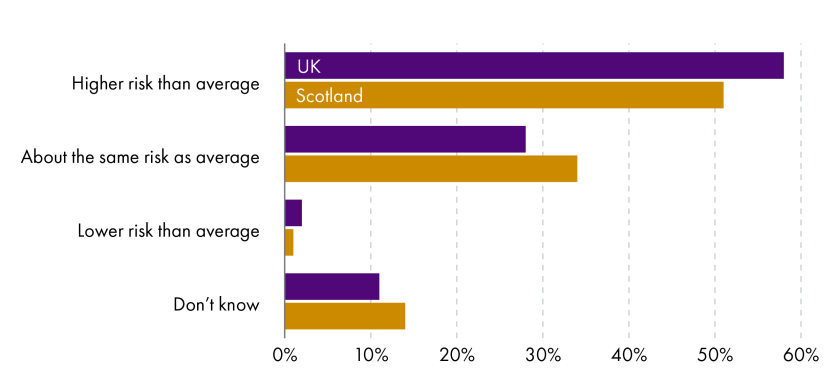
Data source: YouGov survey carried out for The Salvation Army, 2025, YouGov / The Salvation Army Survey Results
Lower age limit to access assisted dying
The Assisted Dying for Terminally Ill Adults (Scotland) Bill, as introduced, provides that assisted dying would be available to terminally ill adults aged 16 or over. In the Health, Social Care and Sport Committee’s Stage 1 report on the Bill, the Committee reported concerns around the age requirement in the Bill following stakeholder evidence.
During the Stage 1 debate on the Bill, Liam McArthur, the Member in charge of the Bill, stated his commitment to lodging or supporting an amendment to raise the age limit for accessing assisted dying under the provisions in the Bill to 18-years and older. On 26 June 2025, Dr Sandesh Gulhane lodged an amendment at Stage 2 to change the age limit within the Bill.
We have been unable to find any polling on the age limits for accessing assisted dying in the UK or Scotland. When age is mentioned in polling to date, and it is not always included, questions refer to provisions/safeguards in relevant legislation and referred to assisting a patient aged 18 or older.
Perception of the medical profession and attitudes of healthcare professionals
Perception of the medical profession
Some public opinion polls have touched on whether assisted dying legislation would have an impact on levels of trust between patients and their doctors.
For example, the YouGov survey carried out on behalf of the Voluntary Euthanasia Society in 2004, alongside the introduction of the Assisted Dying for the Terminally Ill Bill in the House of Lords in 2004, also asked if the Bill would affect trust with doctors:
If this Bill were to become law, would you trust your doctor more, less or the same amount?
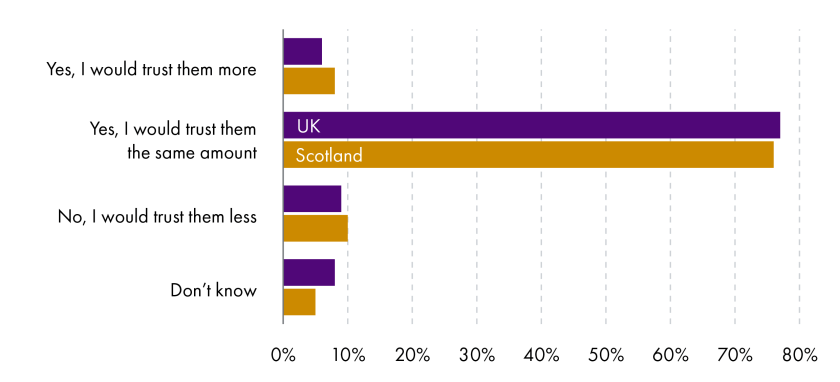
Data source: YouGov survey carried out on behalf of the Voluntary Euthanasia Society, 2004, YouGov Survey Results Results for VES
Attitudes of healthcare professionals
The commissioned review of opinion polls set out in the House of Lords First Report on the Assisted Dying for the Terminally Ill Bill in March 2005, found that:
“Doctors also appear to be notably less in favour of legalising euthanasia than the general public.” “Pharmacists’ views appear (from one limited study) to be largely in line with doctors—less than half were in favour of legalising PAS [physician-assisted suicide]. The sample was split on whether they should/would willingly dispense drugs for suicide.”
Very limited polling has asked the public about the attitudes of healthcare professionals in relation to relevant legislation. In the 2014 YouGov survey aligned with the introduction of the Assisted Dying Bill in the House of Lords,
respondents were told that “on the next few pages, there are some arguments people have made in opposition to assisted dying”. They were then asked how convincing or unconvincing they found each of the arguments. The following argument was posed in relation to doctors:
Many surveys show the majority of doctors oppose a change in the law to permit assisted suicide, as does the British Medical Association, the Royal College of Physicians, the Royal College of General Practitioners, the British Geriatric Society and the Association for Palliative Medicine*.
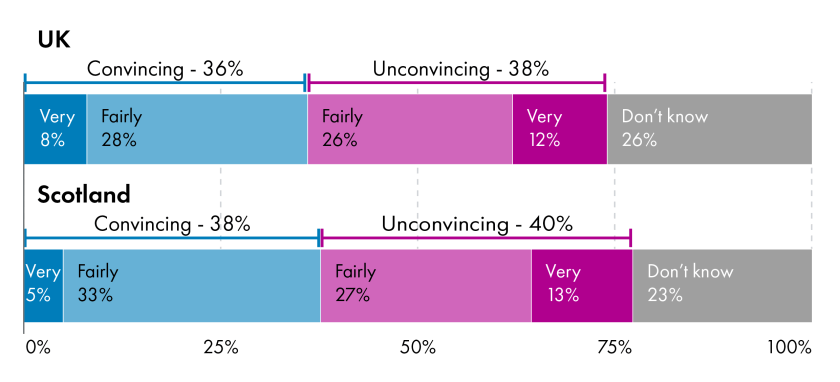
Data source: YouGov survey carried out for Dignity in Dying, 2014, YouGov / Dignity in Dying Survey Results
*while this statement was accurate in 2014 at the time of the survey, several organisations have now changed position.
The SPICe briefing on the Assisted Dying for Terminally Ill Adults (Scotland) Bill, as introduced, found that public opinion polls tended to show greater support for methods of assisted dying that involve doctors. However, it also found that opinions within professional medical organisations were divided.
In 2020, the British Medical Association (BMA) conducted a survey of its members on physician assisted dying. This found:
In relation to prescribing drugs for self-administration:
50% of members personally supported it, 33% opposed it and 11% were undecided,
45% of members would not be willing to participate, 36% would be willing to participate and 19% were undecided.
In relation to administering drugs with the intention of ending a person’s life:
46% of members personally opposed it, 37% supported it and 17% were undecided,
54% of members would not be willing to participate, 26% would be willing to participate and 20% were undecided.
The briefing states that there were also noticeable differences in opinion between specialities, with doctors in palliative medicine, clinical oncology and geriatric medicine least likely to support a change in the law. Those working in anaesthetics, emergency medicine and intensive care medicine were most supportive of a change in the law.
Since the above poll in 2014, several of the organisations listed have changed their position on assisted dying. Most medical organisations have adopted a neutral stance due to the range of opinions within their membership. The organisational stance for each is listed below:
The BMA had consistently opposed all forms of assisted dying since 2006. At the end of 2021, it moved to a neutral position on assisted dying to represent the diversity of opinion within its membership. Despite this neutral stance, it also insists that doctors must have legally protected rights to object conscientiously to participating, should there be a change in law.
The Royal College of General Practitioners (RCGP) Scotland wrote to the Health, Social Care and Sport Committee in April 2025 to indicate that it had also moved to a neutral position of neither supporting nor opposing the legalisation of assisted dying. This decision reflects a move away from their previous position of opposing such legislation since 2005 and was reaffirmed in both 2014 and 2020. The RCGP’s governing council voted on this new position following a survey of its members.
The Royal College of Physicians (RCP) adopted a neutral position on assisted dying in 2019 following a survey of its members, reflecting the range of views throughout medical specialties. In 2025 the RCP issued a position statement on the Terminally Ill Adults (End of Life) Bill in the UK Parliament, stating that while the organisation is neutral, there are professional and clinical issues are integral to legislation, regulation, guidance and safe and effective implementation
The British Geriatrics Society (BGS) maintains a position of opposition to the legalisation of assisted dying in the UK and Crown Dependencies. However, the organisation reports that a significant minority of its members are supportive of the legalisation of assisted dying, but also that that many of its members are undecided.
The Association for Palliative Medicine (APM) also continues to oppose any change in the law that “could lead to the supply or administration of lethal medications to deliberately end a person’s life”. Its position statement cites surveys from 2015 – 2022 of its membership and that of the BMA and RCP as its rationale. The APM undertook its most recent survey of palliative medicine clinicians’ views about assisted dying in 2022. It found that 75% would not be willing to participate in any part of the assisted dying process and 98% stated that assisted dying should not be part of mainstream healthcare.
In addition, the following relevant organisations have indicated a neutral position on assisted dying:
The Royal College of Nursing (RCN) Scotland has had a neutral position on assisted dying for people who have a terminal illness since 2009. However, the RCN Scotland report it has been engaging in the parliamentary process to ensure that the Assisted Dying for Terminally Ill Adults (Scotland) Bill contains safeguards to protect nurses and nursing practice and to protect those nurses that do not wish to participate if the legislation progresses.
The Royal Pharmaceutical Society has a neutral position on assisted dying, but also works to ensure that the views of pharmacists are considered in legislation and that the content of any bills brought in the future reflects pharmacy practice.
In response to the Health, Social Care and Sport Committee call for views on the Assisted Dying for Terminally Ill Adults (Scotland) Bill, Community Pharmacy Scotland indicated that it partially supports the legislation. However, it also emphasised the importance of a conscientious objection clause for pharmacists.
Susan Brown, Health and Social Care Researcher, SPICe
